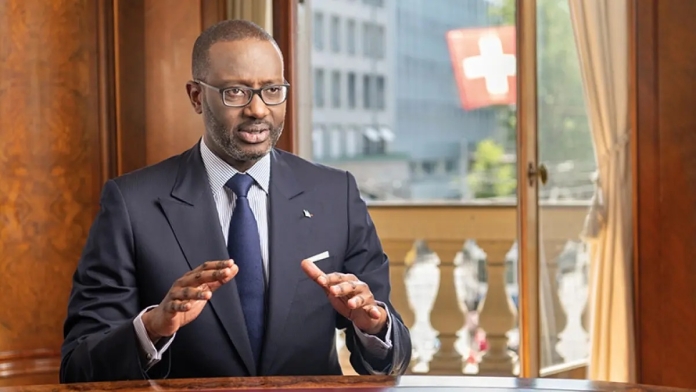The recent decision to remove Tidjane Thiam from Côte d’Ivoire’s electoral roll has sparked widespread outrage. At the heart of the controversy lies Article 48 of the Ivorian Nationality Code, which stipulates that any Ivorian who acquires another nationality after the age of 18 automatically loses Ivorian citizenship. This little-known provision is now at the center of a political and legal storm.
Under this interpretation, a citizen born Ivorian who later acquires a foreign nationality as an adult — for instance, after studying abroad — legally ceases to be Ivorian, unless the dual nationality was obtained at birth. In other words, a child born to one Ivorian and one foreign parent may retain both nationalities, as this dual status is not the result of a later personal choice.
This legal basis was used by individuals close to the ruling party to challenge Thiam’s inclusion on the electoral list. Yet in 2022, he had been duly registered, armed with a valid Ivorian nationality certificate. The Independent Electoral Commission (CEI) had reviewed and validated his eligibility. However, as its decisions can be appealed, the case was brought before a judge who ruled over the weekend that Thiam did not meet the criteria to be on the electoral list, concluding that he was not Ivorian at the time of his registration.
This ruling is based on the assumption that Thiam acquired French nationality after reaching adulthood. However, his lawyers argue the opposite. According to them, Thiam was born French. His father, originally from Senegal, allegedly never held Senegalese nationality but was a French citizen by virtue of his colonial status under French Equatorial Africa (AEF). Thiam’s name appears in the registry of Europeans born in Côte d’Ivoire, which would confirm his French nationality by birth.
Now stateless?
The core of the dispute revolves around a naturalization decree granted to Thiam, which his lawyers describe as “redundant naturalization” — a formal process enabling someone already considered French to fully exercise their rights, without implying that he acquired French nationality as an adult.
Another troubling fact: Thiam recently renounced his French citizenship — a process only permitted by French authorities if the applicant can prove possession of another nationality. This would suggest that, up until that point, Thiam was still officially recognized as Ivorian by France.
The court’s decision therefore creates a legal paradox: if Thiam is no longer French and is not acknowledged as Ivorian, he becomes stateless — a situation inconsistent with international law.
Beyond the strictly legal implications, this ruling has fueled suspicions of political manipulation. In a country with a history of electoral crises tied to nationality issues, the removal of Thiam — a leading presidential contender — cannot be viewed as a neutral act. Some see it as a calculated move to eliminate a serious opponent from the race.
Return of old demons?
Even more concerning is the potential fallout for thousands of Ivorians in the diaspora, many of whom hold dual nationality acquired under circumstances similar to Thiam’s. This precedent could jeopardize their voting rights, or even their citizenship, raising serious administrative and political questions.
Since the early 2000s, Côte d’Ivoire has never held an election without disputes related to nationality. Article 48 — vague and open to interpretation — embodies these long-standing tensions. Clarifying this provision has now become a democratic necessity.
While the decision may please certain political factions, it also deepens divisions within Ivorian society. In an already sensitive climate, it is up to the authorities to act with discernment and ensure that the upcoming presidential election does not reopen the wounds of the past.


